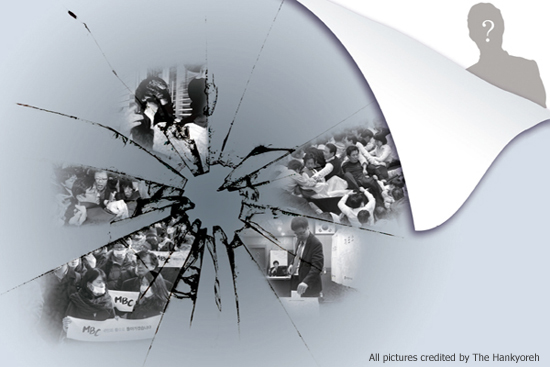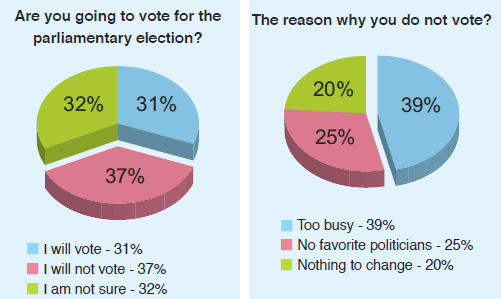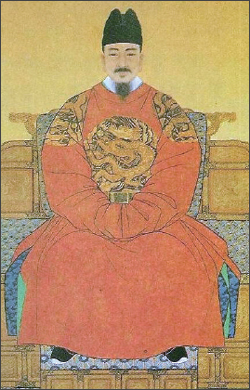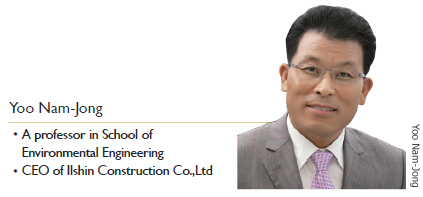
Korean society faced a parliamentary election on April 11. Election time in Korea is usually an out of order affair where candidates make a fuss over sympathy votes and continuously lobby to win for support. Looking at this mess, we have several questions in mind: Will these candidates become a leader precisely at the moment when Korea calls for a righteous leader? Will our future remain bright despite of all these on-going problems? While the candidates themselves are part of the problem, we all have not seriously considered what a truthful and righteous leader is. With the spring election on April 11, The UOS Times is going to talk about what features and qualities an ideal leader should be equipped with and what kinds of efforts the younger generation has to put forward in order to become reasonable leaders in the future.
The word ‘Leader’ means a person who is in an important position in any community or group. Leader has a role of leading the community or the group in the right direction. Their existence is very significant as their decision often determines the society’s destiny. Reversely, society also affect leaders’ appearance or virtue what they have to keep. Actually, the appointment of many past leaders was based on the callings of the people who lived in that time. Therefore, in 2012 when Korea’s presidential elections will be held, it seems our confused political and societal situations will introduce new leaders who will be drastically different from any leaders we have seen before. So, what are the complaints in our society? And where are these complaints coming from?
Analysis on current circumstances
Politics
These days, Korean citizen’s complaints about politics are quietly running high. Political situations, stained by corruption, have been preventing people from finding a glimmer of hope. According to a survey (A random sample of 2,000 people with plus or minus 2.2 percent error) done by SBS, a leading broadcasting company. On June 6, 2010, out of 2,288 participants, 37 percent answered ‘I will not vote’ and 32 percent proclaimed: ‘I am not sure.’ Furthermore, the reasons why the respondents will not vote were, ‘Too busy’ with 39 percent of the respondents, ‘No favorite politicians’ with 25 percent and ‘Nothing to change’ with 20 percent. Through this survey, we discovered the biggest reason why people did not vote was that they were tired of politics with 45 percent. Eventually, continuous absurdities in politics have caused a lack of public participation. ‘DDoS attack’ and ‘Spying scandal’ are representative events showing absurdities well. In case of ‘DDoS attack’, someone attacked down ‘National Election Commission (NEC)’ during the office-going hours from about 6 a.m. to 8 a.m. This prevented many potential voters from finding venues to vote at. Consequently, it lowered the turnout of voters going to work. According to the survey results, the happening was the fault of someone involved in ‘Grand National Party (GNP)’ but was not discovered who was behind the attack. The other case of ‘Spying scandal,’ recently investigated by Prosecution Service, is an event that the office of the prime minister, not the investigative agency, illegally investigated people for political retaliation. Such happenings have made people extremely angry, so finally they are actively calling for new leaders. Among candidates nominated for the general election, in the Saenuri Party, 60 of present 144 members of the National Assembly have failed in enrolling a list of candidates because they were dropped out. A rate of change reached 41.7 percent as the highest record in the party. In the Democratic united party, a rate of that was about 30 percent. These parties reflect the public wishes for political change.

Information communication technology & Science technology
As well as the chaos in politics, aspects of Information communication technology & Science technology also need some improvements. The present government has reorganized some departments for budget reductions ever since Lee Myung-Bak was inaugurated as president. By this, the ‘Korea Communication Commission (KCC)’ appeared while the ‘Ministry of Information and Communication (MIC),’ which had controlled information communication technology, disappeared. However, KCC has been being criticized for having policies that were too partial toward regulations against broadcasting and for not adequately matching the current situation of information communication technology. Furthermore, this commission faces a sarcastic comment by civilians ‘That is for suppression of the press!’
Science technology is also naked against criticism. The present government established the ‘Ministry of Education, Science and Technology (MEST)’ by consolidating the ‘Ministry of Science and Technology (MST)’ and the ‘Ministry of Education (ME).’ After that, many people have been raising disgruntled voices that there in Korea is not any control tower to do Research and Development (R&D.) They all claimed that our leaders did not know the reality about science technology well enough, so they could not respond properly. Information communication technology & Science technology not only have been important until now, but they will also become the growth engine of future-knowledge and a creative economy. For these reasons, they are becoming more and more important in our industries. In response to this reality, industrial circles and academic circles are increasing demand for people with backgrounds in natural science and engineering on the list. Politicians also are insisting on the revival of MIC and MST if they win the election.
Until now, The UOS Times introduced voices from some fields. Corruption, illegal acts and unrealistic policies are no longer overlooked. In rendering it down, our current political realities have not lived up to our expectations and therefore change will come.
Who is an ideal leader in this situation?
Considering the current situation, who is a suitable leader whom we dearly want and need? Korean people these days look for a righteous leader who they can trust, and desire a hero who can save them from the grim realities. This is closely related to the current phenomena called ‘Ahn Chul-soo Syndrome.’ Professor Ahn becomes famous for his risk-taking and courageous decisions to pursue his dream as well as for his transparency and responsibility as a Chief Executive Officer (CEO.) Most importantly, his various attempts to communicate with people spawned the younger generation’s dissatisfaction about the current government, which lacks the ability to sympathize and interact with the public. This is why the reputation of ‘Ahn Chul-soo Syndrome’ is continuously spreading, despite his lack of knowledge and experiences in politics. Arguing over whether Professor Ahn is a suitable candidate for an ideal leader in Korea or not is pointless. The point is to realize the fact that ‘Ahn Chul-soo Syndrome’ actually makes us think about what is the most desirable features of an ideal leader in our current situation.
The UOS Times conducted a survey targeting 141 UOS students in order to find out their ideal and desirable features of a leader. First, we asked them to choose the most desirable quality for a leader among these five typical virtues; Morality, Determination, Communication skill (Sympathy and Interaction), Insight, and Extensive knowledge and diverse experience related to his or her field. As a result, Communication skill won 48.2 percent of the votes, recording the highest percentage among the five virtues. In the second place, Determination won 22.7 percent of the votes and Morality and Insight followed, with each winning 12.1 percent of the votes. Extensive knowledge and diverse experience related to his or her field recorded the least amount of votes among the five virtues.
Considering that determination is the fundamental feature required for a leader leading a group, these results reassured Communication skill and Morality are the features necessary for both the current and the next leaders. To get more information about leadership, The UOS Times also interviewed both the president and vice-president of the Student Council, Kim Kyung-won (School of Environmental Engineering, 05’) and Kim Keun-sik (Department of Philosophy, 06’)
As a result of the survey targeting UOS students and interviews with the president and vice president of Student Council, we conclude that we want a leader who has a sense of morality and who can come up with suitable solutions for the current problems. Most of people do not want a unilateral and compulsive leader anymore.
The UOS Times looked into the case studies of a past leader who had desirable features as a great leader. The time period we are currently living in right now is also a part of our history and history circulates endlessly. Historian E H. Carr also said that history is a conversation between the past and the present. This means, we need to prepare for the future by taking a lesson from past incidents as examples. This is because the comparison between the current and the past helps us to come up with better solutions. In that, The UOS Times is going to discuss an ideal leader and look for a lesson by looking back to the past cases in which we share a similar political and social atmosphere with the present. So, what kinds of leader do we need in our society right now?
Leader of Joseon, King Sejong
King Sejong is one of the few kings who are considered a great leader. Because of that, his popularity has lasted until now. He has been the subject of various research projects and was also a main character in the soap drama called “A deep-rooted tree.” This is because many Koreans admire him due to his virtuous personalities and his useful policies for the sake of his own people. He not only created a Hangeul but also left a great footstep on Korean history. Therefore, The UOS Times is going to explain why we need a leader like King Sejong.
Communication

He was a very communicative leader. In the fall of 1425, Joseon suffered a severe drought. Many people living in Seoul migrated to the southern areas of Korea and almost 700 soldiers deviated from their troops. Even worse, severely corrupted officials in the region exploited the poor. In this unstable and messy situation, King Sejong communicated with his people by listening to their stories face to face. In doing so, he understood the problems of the poor and introduced several innovative scientific inventions such as the Korean rain gauge, as well as a reservoir to address people’s problems. His ability to interact with his people and to reflect their needs made him an even greater leader.
Policy management
King Sejong highlighted the role of Jiphyeonjeon during his period. He constituted 100 members of Jiphyenjeon with talented people in the field of natural science, regardless of their background and status. His unprecedented recruiting enabled Jiphyeonjeon to play a major role as a consultant in all possible aspects of national governing.
King Sejong was able to manage social problems that are still apparent in present society by using these two measures; constant communication with his people and effective policy management. These two measures that were taken by King Sejong are recommendable to our next leader. Furthermore, the role of the young generation in the advent of a righteous and ideal leader is quite important.
The progressive young generation in Korea is also looking for political and leadership change by sharing their political opinions through SNS. This shows the importance of political participation through SNS as a political medium and it is heightened than ever before. As such, the role of the young generation in righteous political change is important regardless of time and space. Of course, this makes current leaders in Korea nervous. Many politicians have already come up with pledges targeting those in their 20s and 30s by organizing political campaigns through SNS. However, some say this is quite contrary to the reality. In reality, the voice of the youth is not taken seriously by the leaders since the influence of the youthful population only takes up a small part both in election and social dominance.
In this sense, the young generation not only has to closely watch the current regime but also needs to emphasize a righteous leadership. The basic way to practice their influence would be fulfilling a civic duty to vote and to express their opinions. Moreover, organizing a group or party would be a good way to active politically for young generations.
Besides bearing the civic responsibility in our mind, we interviewed Yoo Nam-Jong, a professor in School of Environmental Engineering and CEO of Ilshin Construction Co., Ltd., to help those who are interested in becoming a righteous leader or CEO in the future.
Conclusion
To sum up, The UOS Times has covered ‘Leadership’ from A to Z. We tried to answer the questions by conducting a simple survey, analyzing our current situation through a case study of a great leader from our past as well as interviews with experts. As a result, we found out that people want a moral leader whom they can sincerely trust and communicate with. Surprisingly enough, such demand for a moral and communicative leader was apparent 2,000 years ago as well. Mencius once said, a wise leader should rule his people with justice, benevolence, and virtue than with might since the former eventually promotes a peaceful and stable society. His lesson is still valid after 2,000 years. People will naturally support a leader who always respects his people’s opinions and who tries to communicate with them constantly. This would ultimately overcome prevalent problems and troubles in our current society.
Their Voices about Leadership
We conducted a survey asking “what is the most important virtue for a leader” to UOS students, and almost 40 percent of the students chose communication skills (Ability to sympathize and interact) as the most important. What do you think is the reason for this result?
Kim Kyung-won: In the past, the relationship between a leader and their people used to be unilateral as people mostly blindly followed the instructions of their leader. However, these days, as educational levels improve. Also, the widespread use of Social Networking Services (SNS) continues to grow and allows people to communicate with each other like never before. They now want a more equivalent and horizontal relationship with their leader. In doing so, these changes have influenced the young to desire a leader who can sympathize and communicate with them better.
Kim Keun-sik: Students, who used to be oppressed by their high school teachers under the bureaucratic system, are given freedom and a right to speech that they have never experienced before. In this context, with stronger free-will and a sense of autonomy, students want a dedicated leader whom they can share their thoughts and ideas with.
What is your definition of an ideal leadership?
Kim Kyung-won: I would say a friendly leader without arrogance but with humility. I believe an ideal leader should be friendly like a next-door neighbor. Of course, an ideal leader has to exhibit statesmanship, being able to mend different people all together, as well as having professionalism in his/her field as well.
Kim Keun-sik: An ideal leader should take a step along with people instead of taking a step ahead. As I mentioned earlier, everyone excels in one thing. It means that you have your own strength does not justify disregarding others based on differences and having a sense of superiority over others. Being a leader does not mean you can control others in a compulsive way. A good leader is a person who incessantly tries to listen to others’ opinions and to reflect their needs.
About CEO
What is the most important quality of a successful CEO?
The most important role of a good leader is the communication skill. Good leader not only constantly researches and challenges himself/herself but also takes good care of each member of the company. In my case, I set up a communication-oriented performance system and encourage employees to use SNS for effective communication in the company. Furthermore, I often have a breakfast meeting with executives so that I can pick up some news from different departments.

I go to work early in the morning and begin the day either with a breakfast or teatime meeting with directors. After that, I review all the reports and items and manage the overall business. Besides that, I also put in a strong effort to adapt to the fast-changing trends in the market and to constantly progress the company. For example, I exchange useful information with all other companies in the same field at conferences, and go to classes to learn skills that are necessary for CEOs. All these efforts are intended to develop innovative products and effective manufacturing.
What was your most difficult experience?
The biggest difficulty in starting a business is the uncertainty. I, as well, made several mistakes on investing due to the uncertainty of the market trends and my lack of sufficient knowledge and experiences. Among many difficulties, the toughest one was overcoming the economic crisis of 1997. My company was on the verge of bankruptcy but endured the hardship by working day and night and supporting each other. Though it was stressful, this experience ultimately helped me form a strong emotional bond with my employees and better equipped me for the struggle of life.
Could you give any advice for students who dream of becoming a leader?
I want to say “Do what you can do.” I recommend students to further their knowledge and experiences by taking diverse classes while you are at college. It is also important to have firsthand experience by taking on a role as a leader of a group or community. My experiences as a student president, leading other students and communicating with different people, have been very useful. Young people, these days have been criticized for their lack of challenging issues and passion. However, if you have faith in yourself and take risks with your investments and jobs, I am pretty sure that you are going to be successful in the near future.
Jun Hyung-kyu Junior reporter jhk3818@uos.ac.kr
Choi Ji-in Junior reporter jiin_choi@uos.ac.kr

